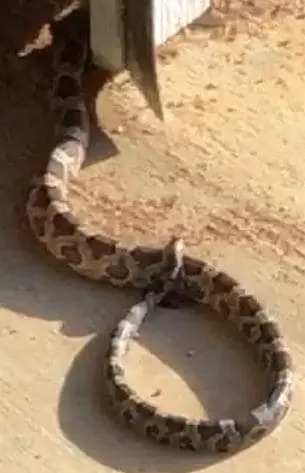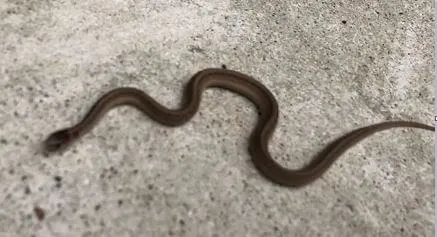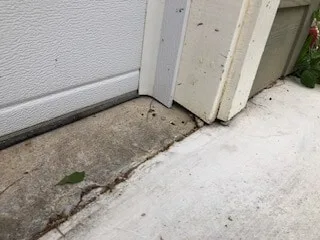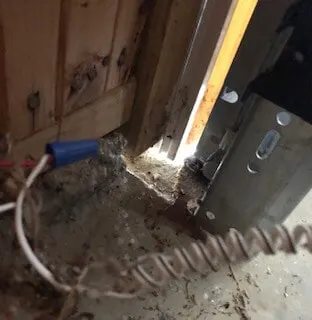Do you have unwanted, scaly visitors in your garage? Although most snakes are harmless, the thought of tripping over a snake on the way to the car is enough to drive most homeowners to burn the place down.
Snakes enter garages seeking shelter, a food source, or both. Rodents in the garage or items stacked against the walls which can provide cover serve as welcoming habitats for snakes.
I had three snakes come into my garage over the summer last year. It turned out, a mouse had built a nice little nest in the corner and I’m certain those snakes were after it.
Understanding why snakes come into garages in the first place can help you understand what attracts them, and therefore how to repel them. If you do have a recurrent issue with snakes, become familiar with the different species in the area. You will want to know the general characteristics of the snake so you can effectively remove and repel it, and you will also want to be aware of any venomous species you may come in contact with.
Do Snakes Live In Garages?
In short, yes. There are many factors that play into whether or not a snake will seek out a garage for shelter. However, just because a snake is seeking out a garage does not necessarily mean they will seek out your garage. Your goal should be to make your garage a less inviting enviroment.
An inviting garage will be surrounded by dense shrubbery, long grass, and yard litter. Once inside, snakes tend to prefer corners or hiding along the walls, so clutter in these areas will provide attractive shelter.

What Attracts Snakes To A Garage?
There are two reasons for a snake to move into your garage: food, and shelter. However, there are a variety of ways your garage can meet these needs:
- Brumation. Snakes do not hibernate quite the same as mammals do. When the weather gets colder, they find a place with adequate
shelter, and curl up for the winter. However, they still wake up to drink water, and they can remain somewhat active. - Heat Source. Snakes are ectotherms, meaning their body temperature is dependent on environmental input. While it may not be time for brumation, snakes may move
in to a garage during cooler weather if there is a heat source, like a hot water heater, or under appliances near the motor. - Shelter From Heat. Alternatively, during very hot weather, snakes may seek out a garage for a cool, dark place to rest. Damp concrete provides an easy way for a snake to regulate its body temperature during the heat of summer.
- Disturbed Habitats. Construction or clearing of an area near your home may drive wildlife into your yard or garage. Even if the snakes themselves were not disrupted, their food source may have been. If you notice an increase in frogs, rodents, and other small animals, it could attract snakes to your property.
- Food Source. Even without disturbed ground nearby, your garage may provide a food source for a hungry snake. If you keep pet food, trash, potting soil, a grill, or anything else that may provide food and shelter for rodents in the garage, you may be providing a buffet for a legless visitor.

How Do Snakes Get In A Garage?
Snakes can get in almost anywhere if they’re motivated. Obviously, they can come in through an open garage door. However, even if the door is closed, they can sneak in through small cracks and crevices.
This is where the snakes were coming into my garage. The outside trim does not go all the way to the concrete. You can see light from the inside where the hole was.


Keep in mind that some snakes are also capable climbers. They will find their way in through pipes, open windows, and behind the siding. If there is a way into your garage, they will find it!
Keep an eye out for the following signs of a snake living in your garage:
- Seeing A Snake. This should go without saying, but if you see one snake in your garage, you should be aware that there may be more, especially during breeding season or as snakes seek a brumation shelter.
- Trails. As a snake moves around your garage, it can leave trails through dust or other materials. A snake trail will look like someone pulled a rubber hose through an area.
- Scat. Snake feces look similar to bird feces. It will be black and white, small, and wet. However, snakes only produce excrement as often as they eat, so this could be difficult to find.
- Skin. Snakes can shed their skin as often as once a month, although older snakes shed only a few times a year. If you find a snake skin in your garage, look for other signs that a snake has taken up residence.
How To Find A Snake In Your Garage
If you have seen signs of a snake living in your garage, you have a few options. You can call a snake removal service, and ask that they come search for the snake. You could set a snake trap. Or, you can try to find it yourself and remove it.
If you have any reason to believe the snake in your garage is venomous, call a removal service. Only attempt to find and remove a snake if you’re sure it’s harmless.
While there are debates as to the effectiveness of traps, it is easier to try to get the snake to come to you than to tear apart the garage. However, traps attract snakes with the scent of food, so it’s possible that you lure a snake into your garage by accident. Set up traps along walls and in corners. If you do catch a snake, take it to a safe location and follow the directions for opening the trap while maintaining a safe distance.
If you’re comfortable searching your garage, start by looking in dark, sheltered corners. Next, look inside and under boxes and other items along the walls. Snakes will also seek out heat sources, so check under appliances and near the water heater. It’s unlikely that the snake will go up, so focus your energy on places low to the ground that provide shelter. Wear thick gloves, close-toed shoes, and long pants during your search.

Have A Snake In Your Garage? You Have Three Options
If you do find a snake in your garage, you have a few options. First, if the snake is within view, keep an eye on it as you decide what to do. If it does slither behind or under something, stay where you are.
Snakes retreat when they feel threatened, and as long as you remain a “threat,” they should stay hidden in the same spot. If you leave, they will move to a new location, and you will have to start over.
Note: I do not recommend you deal with the snake yourself. The safest approach is to have a professional deal with it! That being said, here are your options:
- Catch It. If you decide to catch the snake, you take on a certain degree of risk. If you’re willing to take that risk, dress safely in thick clothing, shoes, and gloves. Then, lay a bucket or trash can on its side, and use a broom to push it into the container. Put the lid on, and relocate the snake to a safe location. You should be absolutely certain that the snake is not venomous before you attempt this. Another option is to purchase a snake trap. This is essentially a large box made of ABS plastic that includes a glue pad. The snake crawls in and gets stuck on the glue pad. Handle with care after that!
- Kill it. Some snakes are pests, and you can kill them if they are on your property. However, before you kill a snake, check to make sure it is legal. Some snakes are protected by law, and they must be relocated. If you do decide to kill the snake, the most humane method is to quickly crush, not sever, the head.
- Encourage It To Leave. There are a few commercial repellents on the market, but their success is limited. It is easier and far more effective to make your garage inhospitable so the snake decides to move out on its own. Move items off the floor and up onto shelves to reduce hiding places, and store any food items in airtight containers to reduce rodent activity.
Conclusion
Snakes can be an unwelcome, frightening resident in your garage. However, most are harmless and play a vital role in the ecosystem. Generally speaking, if you make your garage unwelcome by removing their food source and shelter, snakes will find a new home that is better suited to their needs.
In my garage, I used a glue pad to catch the mouse that the snakes were after. I also took everything off of the floor that I could. I paid particular attention to the corners. Finally, I took the time to seal a few cracks and crevices with Great Stuff foam spray and caulk.
To prevent snakes from coming into your garage, eliminate every opportunity to enter and remove the reasons a snake will want to make your garage
Snakes in a garage are one thing, but if you have them coming into your house, it means you have some serious air infiltration issues. These are not only allowing insects and reptiles in, they are costing you a significant amount in energy waste. Click here to learn the answers to common questions on air-sealing a home.
Related Questions
Home Remedies To Keep Snakes Away – Fact Or Myth?
Part of creating an unwelcoming environment for snakes has to deal with their sense of smell. Snakes do not smell through their nostrils. They sense smell with their tongue (source). There are a ton of home remedies on the internet, but not all of them are effective. Let’s separate fact from myth.
Do Moth Balls Really Keep Snakes Away?
Mothballs have not been found effective as a snake deterrent. They also pose a serious health threat to homeowners and pets from prolonged exposure of the toxic vapors that are essentially an insecticide (source). It is best to avoid this approach to keeping snakes away.
Does Sulfur Keep Snakes Away?
Sulfur has not been proven effective at keeping snakes away. In addition, it can be irritating to the respiratory system of humans who inhale it so it would not be wise to use this in a closed area (source).
Does Salt Keep Snakes Away?
There is no evidence that salt is an effective snake deterrent.
Does Vinegar Keep Snakes Away?
There is a great deal of debate on whether or not vinegar is an effective snake deterrent. The jury is still out on this one but you are better served eliminating welcoming shelter.
Does Lye Keep Snakes Away?
Lye is highly caustic and while it may serve as a deterrent to snakes it is not a recommended solution.
What Is The Best Snake Repellent For A Garage?
The best snake repellent is eliminating a habitable environment and preventing entry.
Seal gaps and cracks where snakes enter. Ensure there is no food source or shelter. As a result, snakes will not be as enticed or likely to enter your garage.
As a homeowner, I am constantly experimenting with making the structure of my house more energy-efficient, eliminating pests, and taking on DIY home improvement projects. Over the past two decades, my family has rehabbed houses and contracted new home builds and I’ve learned a lot along the way. I share my hard-learned lessons so that you can save time and money by not repeating my mistakes.

